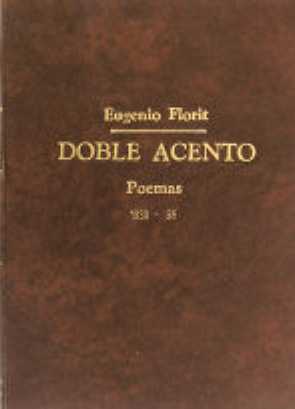4.1.1.15.2 The poetry collection “Double accent”, 1937, by Eugenio Florit (1903 – 1999)

“Double Accent” is one of the most important pieces of the national lyrical tradition; it was prologued by Juan Ramón Jiménez, who would later say: “It fuses two strands of Spanish poetry, the pure and the baroque, into a single, equal or interconnected style…” This is already hinted at in the title and certainly points to the flow of two currents that were sometimes considered opposed.
The pure and baroque movements, despite their differences, share a common foundation: a conception of poetic language as an object in itself; Florit’s fusion aims for sounds with strange resonances, conceptually concomitant with an intimacy that enhances the detachment from external circumstances characteristic of purism.
This collection of poems vindicates the ties between island creation and Spanish poetry, whose deep spring had always nourished our aesthetic achievements—with the logical rupture that the emancipatory struggles of the nineteenth century had entailed—all of which is consistent with the attitude of the group associated with the Revista de Avance and anchored as a trend in the innovative searches of the period.
One of the key pieces of “Doble acento” and at the same time one of the most transcendent of the national lyric poetry, is “Martirio de San Sebastián”, in which the author allows himself to be carried away towards a certain fruition by the imminence of death, a religious mysticism that permeates some of Florit’s pieces, with a certain inheritance from the Hispanic religious thematic lines:
“…How little is left, sir, to see you.
And I will look with eyes that have overcome the arrows;
and I will hear your voice with everlasting ears;
and to the smell of your roses I will be as if in ecstasy;
and I will play with hands that nurtured these fierce doves
and I will taste your honey with the lips of my soul.
I’m coming, Lord, Oh! what a dream of suns,
what a path of stars in my dream.
I know my last pigeon is coming…
Oh! All right, Lord, I’ll take her to you.
sunk in a corner of the bowels!”
Even to capture a cosmos of ideas with a religious imprint, the author appeals to the sensorial to reach its underlying essence, a sensitivity beyond the organs, a purely spiritual realm. This sensitivity becomes “tropicalized” by anchoring itself in this particular geographical space, from its symbolic referents and its natural baroque, beyond words, in “To Juan Florit, Poet in Chile”:
“Here, from this point on earth
so distant from yours, even though they are both America.
Here, I say, country of rumba and coconut milk,
on the threshold of the oven where the world is toasted.
Here, where the sea is clear like burning mica
and the night has a brighter voice than the day.
Here I am with my sonorous name on point,
on the classic line of rotten verses,
in the tribe of twenty Caribs with trumpets on their bows
to kill the old right-wingers.”
Regarding this collection of poems, Roberto Fernández Retamar would say: “The work presents two aspects: one of serene, perfect poetry; the other of breathless, more thrilling poetry, where the poet breaks the boundaries of pure poetry.” In this sense, Florit would possess a style that is more than eclectic, holistic in its interweaving of currents to give rise to an aesthetically superior poetic output.








